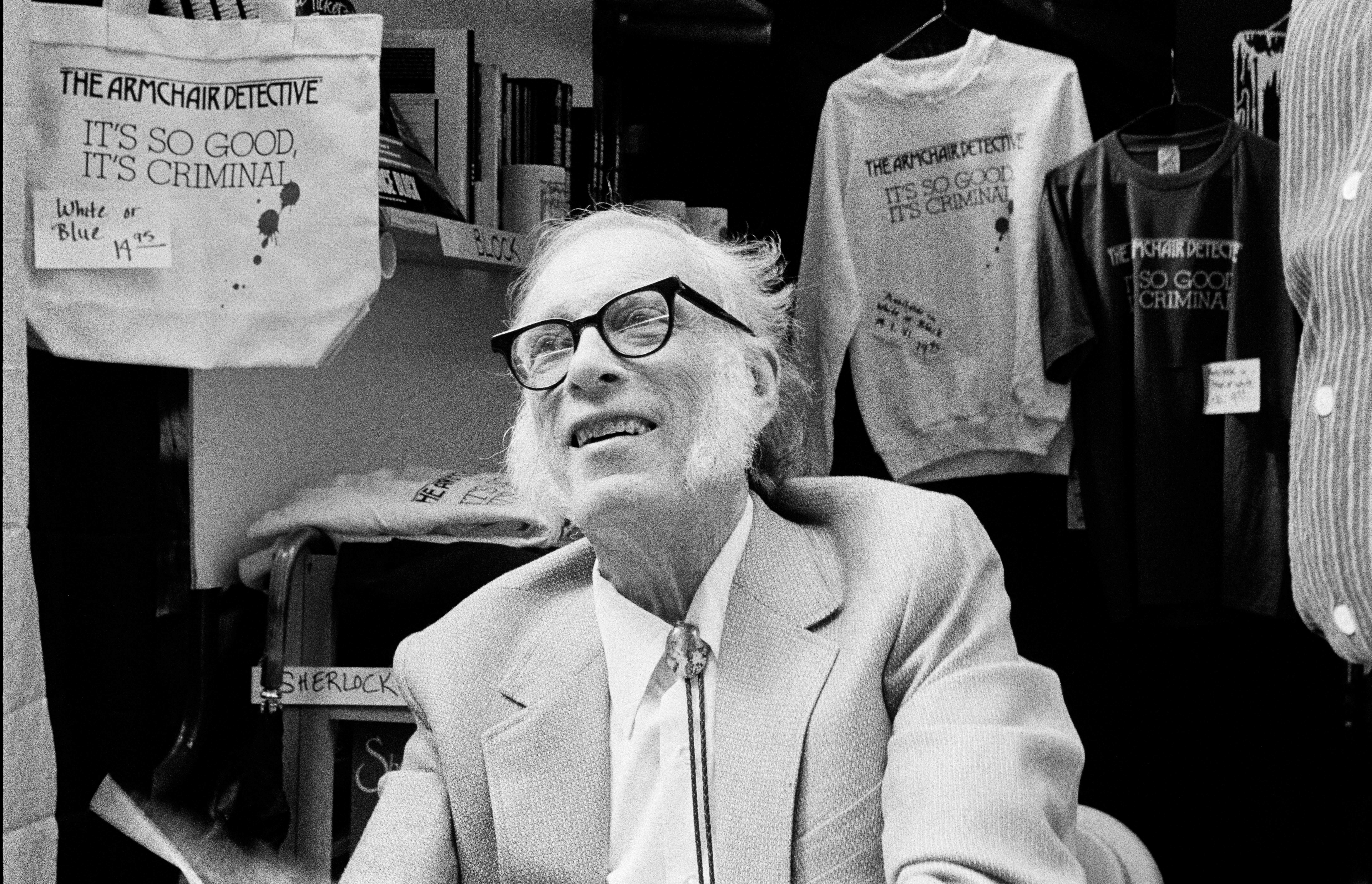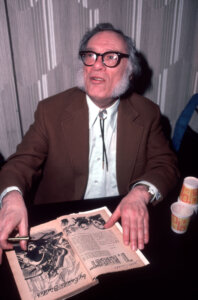How sci-fi visionary Isaac Asimov foresaw the madness of our forthcoming election
In Asimov’s short story ‘Franchise,’ a super-computer runs elections and only one man gets to vote

Isaac Asimov at the ‘New York is Book County’ fair, 1990. Photo by Getty Images
With less than three weeks to election day, pundits and pollsters are desperately seeking the Norm. Not just any Norm, but a specific Norman — in this case, Norman Muller.
No doubt, the name does not ring any bells. Unless, that is, you grew up as a reader of the writings of Isaac Asimov. Forget the Foundation series, though, as well as I, Robot. Instead, think back to Asimov’s short story “Franchise.” Nearly 70 years after the story’s publication in the pulp science fiction magazine If, we have only now caught up with Asimov’s prescience.
This, at least, was the epiphany I had while driving home from work one afternoon last week. I was listening to yet another NPR story about the media’s never-ending pursuit of our postmodern unicorn — namely, the truly undecided voter. The obsession is understandable: Thanks to the polarization of the electorate and preposterousness of the Electoral College, rarely will so few voters do so much for so many people.
The fact that this “much” may include the mugging of our nation’s founding ideals explains, in part, the media’s obsession over undecided voters. (Of course, the very existence of voters who, in the face of this extinction event, continue to dither also explains our morbid interest in them. It’s a bit like watching someone who, with their kitchen on fire, is wavering between pouring oil or water over the flames.)
As an ideal type, the undecided voter inhabits the no-man’s land between those who want to take America back and those who will not go back. While some undecided voters describe themselves as having voted in the past for both Republican and Democrats, others define themselves as rarely motivated to vote for either party. Either they find this civic responsibility of too little importance, or they find the weight of responsibility too great.
Take Norman Muller, for example. On the eve of the election — Asimov sets his story in 2008, the same year that Nate Cohn’s data-driven model predicted Barack Obama’s victory — Norman frantically blurts to his wife, “The responsibility is too great.” But don’t get him wrong: It is not that he feels strongly about either of the two candidates. Instead, he does not seem to feel strongly about most anything at all. Norman’s forehead, we are told, betrays “deepening lines of uncertainty” and he aspires to little more than meeting his responsibilities as a clerk somewhere in Indiana.

Admittedly, his situation differs from that of undecided voters today. In Asimov’s 2008, Election Day is not what it once was, when Americans trooped to the polls and cast their votes. Instead, with the goal of ending the partisan politics and wasteful spending, the government introduced an easier and sounder method. Now, only one man votes — And in 2008, that man was Norman.
There is just one criterion for being chosen. As Norman learns from Phil Handley, the secret service agent overseeing the event, the election requires “not the smartest, or the strongest, or the luckiest, but just the most representative American.” Multivac, the world’s largest computer, not only chooses the voter, but decides how this most representative of voters would have voted.
Need Phil add there is no reason to have Norman pull a lever in a voting booth after weighing his choice? Or ask any other American to do so? Instead, Multivac “already has most of the information it needs to decide all the elections.” All that remains is for the computer — Asimov based it on the large frame computer Univac that had just come into use — to “check certain imponderable attitudes of mind.”
Norman spends three hours plugged into the computer while answering a dizzying and, at times, baffling range of questions. At the end of this ordeal, the only question he recalls is what he thought of the price of eggs. (Norman confessed he did not know what they cost.) At the story’s conclusion, we are left with the declaration that the citizens of this “electronic democracy had, through Norman Muller, exercised once again its free, untrammeled franchise.”
I was in my early teens in the late 1960s when I first read this story. Back then, I belonged to the Science Fiction Book Club. Every month, I received a box of books from the club. While the names of the usual greats — Arthur C. Clarke and Robert Heinlein, Harlan Ellison and Larry Niven —often figured among the authors, it seemed then, as it does now, that at least one book was by Asimov. One of these books, Earth Is Room Enough, was a collection of short stories that included “Franchise.”
I never quite knew what to make of Asimov. His relentless industry intimidated me nearly as much as his outlandish sideburns: great hairy hedgerows that lent him the image of a very intense hobbit. Back then, I vaguely knew Asimov was Jewish, but I did not yet know that he considered himself, at best, as only vaguely Jewish. Unlike his parents, who were Orthodox Jewish immigrants from Russia, Asimov turned away from Judaism and towards secular humanism. His was an especially combative kind of humanism, one that always expected the best of human beings and, consequently, was almost always disappointed.
When I first read “Franchise,” I was too busy gawping over the role of Multivac in deciding elections to give much thought to the role of Americans in allowing this to come to pass. It is only upon rereading it that I am struck by Asimov’s impatience with his fellow human beings. This simmering impatience burst into the open in “The Cult of Ignorance,” an essay Asimov published in Newsweek in 1980.
Pouncing on the buzz phrase “Americans’ right to know,” Asimov wonders what this could possibly mean for a functionally illiterate citizenry. He notes that most Americans not only resist reading, but are proud of this resistance. This venerable strain of anti-intellectualism, he observes, means most Americans assume that “their ignorance is just as good as your knowledge.” As for those who prize knowledge, they are “elitists” who, like Adlai Stevenson in 1952 and 1956, are rejected by the majority who instead “flocked to a presidential candidate who invented a version of English all his own.”
Nearly 50 years later, Asimov’s fiery critique is as prescient, but also as quaint as “Franchise.” The cult of ignorance has morphed into the cult of MAGA, the experts who were once mocked are now marked as “enemies within,” and a presidential candidate who tripped over words has been replaced by a presidential candidate whose words veer from the vile to the violent. One wonders if even Hari Seldon, Asimov’s famed character from his Foundation series, could have predicted, much less prevented, what has happened to our nation.





















